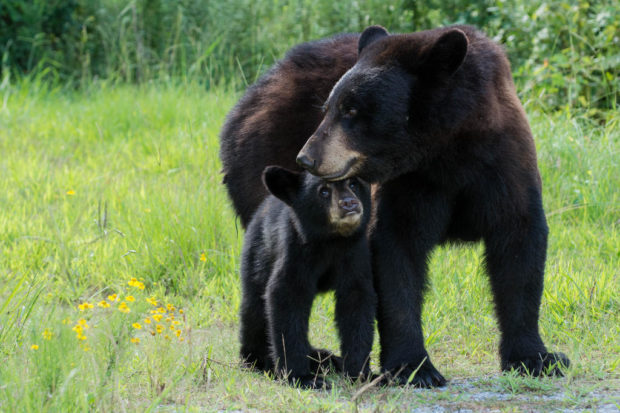
During the 2015 hunting season in Florida, 304 bears were killed in just two days, including 179 female bears. Approximately 38 of those were lactating, meaning these bears had cubs they were still feeding and caring for. Photo by Anton Sorokin/Alamy Stock Photo
Florida authorities are now considering a proposal to manage the state’s black bear population, including a plan that could open the animals to the sights of trophy hunters. But a new statewide poll shows that more than two-thirds of Floridians are against the idea of killing bears, with the opposition even stronger than it was in 2015 – the last and only time in decades that the state allowed its bears to be hunted.
The Florida Fish and Wildlife Conservation Commission is expected to discuss its plan in December at a meeting in Panama City. That plan could include the terrible practices of bear baiting and hounding – luring bears with mounds of junk food, or allowing packs of dogs to chase and corner them.
But the state’s residents want none of this. The poll, commissioned by the Humane Society of the United States and conducted by Remington Research Group in October among 1,385 likely voters, shows that strong majorities in every demographic group and belonging to every political affiliation support continued protection for the black bears. Seventy-eight percent came out in opposition to bear hounding, and 80 percent oppose baiting, both practices still used in a handful of other states.
During the 2015 hunting season in Florida, 304 bears were killed in just two days of frenzied killing. An astonishing 179 female bears were among those hunted, and 21 percent, or approximately 38 of those, were lactating, meaning these bears had cubs they were still feeding and caring for. The killing of these mother bears would have left an estimated 76 to 114 orphaned cubs, many of whom would have very likely died of starvation or predation, further increasing the body count.
Numerous studies also show that such killing does nothing to reduce human-bear conflicts. In fact, there’s evidence to the contrary. Young bears and orphaned cubs who do not die move into vacant territories of bears who were killed, and, deprived of learning from mom about how to obtain food, are more likely to be involved in conflicts with people. In 2015, the year of the black bear trophy hunt, Florida saw the most human-bear conflicts in several years.
Given all this, it makes no sense for bear management in Florida to include more killing and deaths: these animals already face severe threats from climate change, habitat loss, vehicle strikes and illegal poaching. Instead, what the FWC needs to do is educate the public about coexistence with bears. The draft management plan already goes into significant detail about how to avoid conflicts, and we commend the agency for getting this important information in. But more can be done on this score.
Bears play an important role in maintaining the ecological systems in their forests. Killing them helps no one except a handful of trophy hunters. On the other hand, the use of non-lethal, practical and commonsense approaches – such as using bear-resistant trash cans, cleaning up barbecue grills, feeding pets indoors, and using electric fencing around chicken coops and beehives – effectively prevents conflicts, and allow bears and humans to coexist peacefully.
After Florida’s bloody bear-killing season in 2015, opposition poured in from every quarter, with dozens of demonstrations held by residents across the state. Most major newspapers in Florida opposed the idea of another hunt. Even some hunters came out in opposition to the trophy killing of black bears. The FWC heeded those voices at the time and decided not to allow another hunt in 2016 and subsequent years. Nothing has changed now, except that the voices speaking out against the bear hunts are louder than ever. If you live in Florida, please try and attend the meeting in Panama City on Dec. 11th and 12th — you can check the FWC website for details as the date draws closer. Urge the agency to continue on a path that focuses on peaceful solutions for managing its native carnivores.
The post New poll shows more Floridians than ever oppose hunting of black bears appeared first on A Humane World.
Enviroshop is maintained by dedicated NetSys Interactive Inc. owners & employees who generously contribute their time to maintenance & editing, web design, custom programming, & website hosting for Enviroshop.
